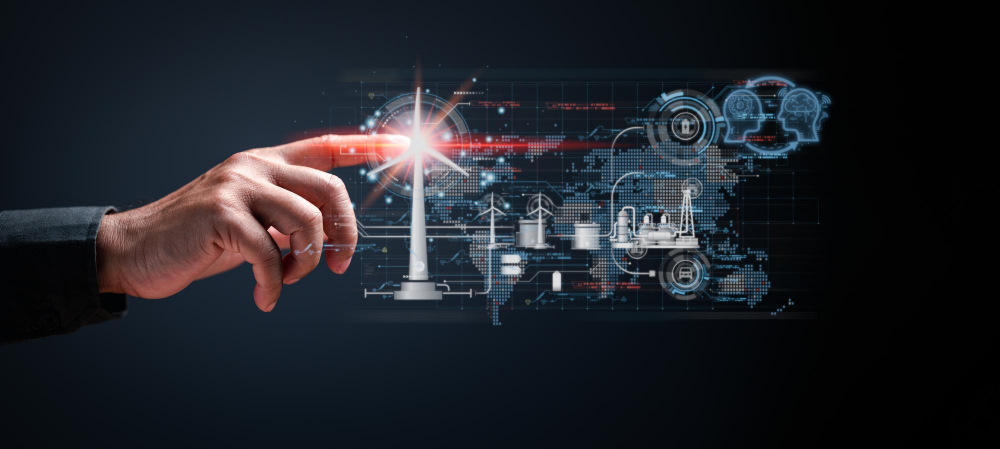- Blog
- May 29, 2024
AI Solving Global Supply Chain Crisis

- Blog
- May 29, 2024
AI Solving Global Supply Chain Crisis
Introduction
The global supply chain, the intricate network that connects manufacturers, suppliers, distributors, and retailers worldwide, has encountered unprecedented challenges in recent times. From natural disasters to pandemics like COVID-19 and geopolitical tensions, these disruptions have wreaked havoc on economies and businesses globally. Amidst these crises, there lies an opportunity for transformation through the adoption of AI (Artificial Intelligence) technologies. This blog explores how AI can revolutionize supply chain management and contribute to building resilience in the face of uncertainty.
The Global Supply Chain Crisis Explained
The global supply chain crisis is a complex phenomenon that has gathered widespread attention in recent times. It represents a web of challenges and obstacles that obstruct the seamless movement of goods and services across international borders. This crisis has been propelled by a multitude of factors, ranging from pandemics and trade conflicts to natural disasters and geopolitical tensions.
At its core, the global supply chain crisis is a manifestation of the vulnerabilities inherent in traditional supply chain models. These models, once hailed for their efficiency and cost-effectiveness, have been laid bare by a series of disruptive events. These disruptions have reverberated across industries, leading to delays, shortages, and increased costs.
Factors Contributing to the Crisis:
- Pandemics: The COVID-19 pandemic acted as a wake-up call, revealing the vulnerability of global supply chains. Lockdowns, travel restrictions, and outbreaks in manufacturing hubs disrupted production and distribution channels, resulting in widespread shortages of essential goods.
- Trade Conflicts: Escalating trade tensions among major economies have worsened the supply chain crisis. Tariffs, retaliatory actions, and uncertainty surrounding trade policies have interrupted established supply chains and diminished business confidence.
- Natural Calamities: Hurricanes, earthquakes, wildfires, and floods have caused widespread disruption to supply chains worldwide. These events can impede transportation routes, damage infrastructure, and halt production facilities, leading to significant interruptions in the flow of goods.
- Geopolitical Instabilities: Geopolitical tensions and conflicts have also contributed to the supply chain crisis. From sanctions and embargoes to political unrest and regime changes, geopolitical uncertainties can disrupt trade flows and weaken the resilience of supply chains.
Real-world Impacts:
The extensive and profound consequences of the global supply chain crisis are evident, with real-world instances serving as stark reminders of its far-reaching effects:
- Shortage of Critical Medical Supplies: During the height of the COVID-19 pandemic, healthcare systems worldwide grappled with shortages of vital medical supplies, including personal protective equipment (PPE), ventilators, and pharmaceuticals. This highlighted the vulnerabilities of healthcare supply chains and the urgent need for resilience.
- Disruptions in Semiconductor Manufacturing: The semiconductor shortage, exacerbated by factors such as increased demand for electronics and supply chain disruptions, has reverberated across industries, affecting automotive production, consumer electronics, and beyond. This bottleneck underscores the interconnectedness of global supply chains and the ripple effects of disruptions in key sectors.
AI in the Supply Chain
In today’s fast-paced business landscape, Artificial Intelligence (AI) emerges as a profound tool, akin to a brilliant assistant, for tackling supply chain complexities with unparalleled precision and efficiency. Imagine having an astoundingly intelligent assistant capable of assimilating vast amounts of data, learning from it, and autonomously executing tasks. That’s precisely the role of AI in modern business operations.
Consider the realm of supply chains, the intricate web responsible for manufacturing, distribution, and delivery processes. Here, AI holds immense potential to revolutionize operations. It aids in optimizing purchasing decisions, streamlining production processes, orchestrating seamless logistics, and ensuring timely deliveries to customers.
For instance, AI can accurately forecast consumer demand, enabling companies to tailor their production levels accordingly, thereby minimizing wastage and maximizing efficiency. Moreover, it can strategize the most efficient and cost-effective routes for product distribution, saving both time and resources.
In essence, AI serves as a brilliant ally in the realm of supply chains, simplifying complexities and enhancing efficiency for all stakeholders involved. Its integration into business operations heralds a future where tasks are executed smarter, faster, and with greater precision.
AI Solutions to the Supply Chain Crisis
Today, businesses face a lot of ups and downs in getting their products to customers. But with AI, there are a few smart solutions as follows
- Guessing Demand and Managing Inventory: AI helps us guess how much of a product people will want. It also helps us manage how much of that product we should have stored. This means we can make sure we have just enough inventory to sell without having too much leftover.
- Making Deliveries Easier: AI can figure out the best ways to deliver products quickly and without spending too much money. It plans the routes and schedules for deliveries so things run smoothly. This saves time and money for businesses, and it gets products to customers faster.
- Keeping Track of Things with Blockchain: By combining AI with blockchain technology, we can keep a close eye on everything in the supply chain. Blockchain keeps a secure record of every step, from where products come from to where they end up. This helps build trust and makes sure everything is done right.
Case Studies of AI in Action
Numerous companies have already embraced AI to navigate supply chain disruptions successfully. For instance, retail giants like Amazon and Walmart leverage AI algorithms to optimize inventory management and anticipate consumer demand more accurately. Similarly, logistics companies such as UPS and FedEx utilize AI for route optimization, leading to cost savings and enhanced operational efficiency. These case studies demonstrate the tangible benefits of AI adoption in mitigating supply chain disruptions and driving business success.
Challenges and Limitations in Implementing AI in Supply Chain Management
While AI offers immense potential, its implementation is not free from challenges and limitations. Technical hurdles, including data integration issues and algorithmic bias, pose significant obstacles to widespread adoption. Moreover, ethical considerations surrounding data privacy and the impact of automation on the workforce raise important questions about the role of AI in supply chain management. It is crucial to address these challenges proactively and ensure that AI is deployed responsibly and ethically.
- Technical Hurdles: Integrating AI into existing supply chain systems often encounters technical challenges. These may include compatibility issues with legacy systems, data silos across different departments or partners, and the need for robust infrastructure to handle the computational demands of AI algorithms.
- Algorithmic Bias: AI systems can inherit biases present in the data used to train them, leading to unfair outcomes or discriminatory practices. Addressing algorithmic bias requires careful data curation and algorithm design to mitigate biases and ensure fair decision-making processes throughout the supply chain.
- Data Integration Issues: The effectiveness of AI in supply chain management relies heavily on access to high-quality data from various sources. However, integrating data from disparate systems, formats, and sources can be complex and time-consuming, requiring significant investment in data governance and interoperability standards.
- Ethical Considerations: As AI systems increasingly influence decision-making in supply chain operations, ethical concerns surrounding data privacy, transparency, and accountability become paramount. Stakeholders must navigate the ethical implications of AI deployment, balancing efficiency gains with the protection of individual rights and societal values.
- Impact on Workforce: Automation driven by AI technologies has the potential to disrupt traditional supply chain roles and workflows, leading to workforce displacement or the need for upskilling and reskilling. Managing the transition to an AI-enabled workforce requires thoughtful planning and investment in human capital development initiatives.
- Regulatory Compliance: The evolving regulatory landscape surrounding AI, particularly concerning data protection and privacy laws, adds another layer of complexity to AI implementation in supply chain management. Organizations must stay abreast of regulatory developments and ensure compliance with relevant laws and regulations to avoid legal risks and liabilities.
- Resource Constraints: Deploying AI solutions in supply chain management often requires substantial investments in technology infrastructure, talent acquisition, and ongoing maintenance. Limited resources may constrain the scalability and sustainability of AI initiatives, necessitating careful prioritization and resource allocation strategies.
Addressing these challenges and limitations requires a holistic approach that encompasses technological innovation, ethical governance frameworks, stakeholder engagement, and continuous learning and adaptation. By proactively tackling these issues, organizations can unlock the full potential of AI to drive efficiency, resilience, and sustainability across the supply chain while upholding ethical principles and societal values.
The Future of AI-Powered Supply Chains:
As we gaze into the future, the transportation of material stocks between destinations is increasingly intertwined with AI-driven insights. Innovations such as edge computing, internet-connected smart devices, and autonomous vehicles are poised to revolutionize supply chain operations to an unprecedented degree. With a growing number of companies investing in AI tools, it’s evident that AI has the potential to completely disrupt global logistics networks. This transformative shift holds the promise of not only optimizing supply chains for environmental sustainability but also fortifying their resilience in the face of global challenges.
By using AI to make supply chains more efficient, we can reduce waste and pollution, making things more sustainable in the long run. Moreover, in times of unforeseen events such as natural disasters or global crises, AI empowers supply chains to quickly adapt, ensuring the uninterrupted flow of essential goods to critical destinations.
Conclusion
In summary, AI emerges as a formidable asset for tackling the multifaceted challenges confronting the global supply chain. Through the utilization of AI-driven analytics, automation, and optimization, organizations can fortify their resilience and agility amid uncertainty. As we navigate the intricate terrain of the modern supply chain, businesses must wholeheartedly embrace AI solutions and cultivate a culture of innovation. By doing so, we pave the way for a more sustainable and robust supply chain ecosystem that not only meets the needs of stakeholders but also fosters long-term economic growth and prosperity.




